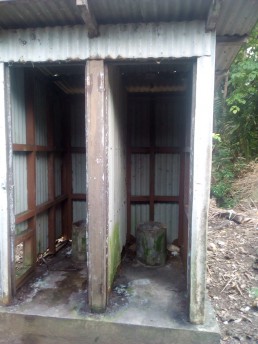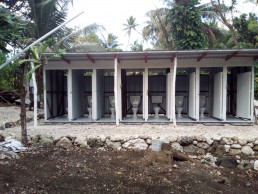Three years on Grochem, Nordox and growers continue to support the UNICEF water sanitation and hygiene (WASH) in schools programme in Vanuatu that impacts the lives of 8,100 children and their communities.
The project today is seeing some real tangible outcomes but it hasn’t been without some major challenges since getting underway in 2016. The most significant being the Ambae volcanic eruption in September 2017 where 10,000 people were evacuated to Maewo Island, followed by a further full evacuation of the remaining residents in April 2018.
During this time all resources went into supporting the water and sanitation infrastructure of Maewo Island. This caused early setbacks for UNICEF to establish the clean water and sanitation project within many schools in the Penama region of Vanuatu, however things are looking up for the UNICEF project and the communities they’re working with.
On a recent trip to the Horticulture New Zealand conference, which has a specific focus on ‘Recognised Seasonal Employees’, held in Port Vila Vanuatu, Grochem General Manager Grant Morrish took the opportunity to speak with UNICEF water and sanitation specialist Emily Rand who commented – “just by having clean water close to the toilets would save children’s lives”.
UNICEF also shared some eye-opening statistics with us about the communities in Penama province Vanuatu including:
- Over 70% of schools water supply are in poor
- 68% of schools do not have functional hand washing facilities near toilets.
- 63% of schools report the water is not clean and
- Children are getting sick and miss out on or drop out of
- Without clean water and sanitation, the lives of children in Vanuatu are at
This year marks the third year of Grochem’s involvement with the UNICEF WASH project where Grochem and Norwegian company Nordox have donated a further $25,000. For every $1 raised for this project the New Zealand government, through the Ministry of Foreign Affairs and Trade, add an additional $4. This support super sizes the Grochem initiative to ensure real positive and tangible change can be made to the Vanuatu schools and communities of Penama.
In the past year, significant progress has been made. Currently each school is applying to the Vanuatu government for suitable latrines for their school. UNICEF provide the new latrines in kitset form complete with instructions; these are built by the local communities after training from a UNICEF led team. Several schools already have their new latrine blocks built and in use, with hand washing stations close by. The Vanuatu government and UNICEF relationship underpins this campaign and can not be underestimated for its continued success.
The UNICEF goal is for schools to have their new facility upgrades completed over the next three years.
The UNICEF approach is to set up systems and services whereby the communities can continue to benefit from the programme put in place and continue maintaining their infrastructure when the UNICEF resources are directed to other communities. Already UNICEF have seen an increase in school attendance rates, and combined with a strong emphasis on hygiene education has meant communities can now manage their own WASH facilities and future upgrades.
The UNICEF WASH project now includes increased disaster resilience with more schools able to be used for evacuation centres in times of emergency, meaning schools will be better prepared to withstand future disasters for both students and the surrounding community.
Grochem, along with Nordox Norway thank you for your continued support of the Nordox product. Your support enables us to provide the schools of Penama Vanuatu with safe water and clean sanitation facilities, and not just for today, but well into the future.

